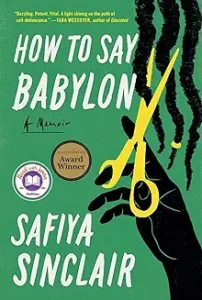How to Say Babylon by Safiya Sinclair 2023
Recommended by Penny, one of my most reliable ‘recommenders’, I found this memoir of a girl’s early years in Jamaica to be difficult reading. The difficulty did not lay in the writing which was often quite beautiful and always powerful, but in the story of a complex, often brutal, but ultimately victorious life.
Safiya Sinclair was the oldest of four children born to Esther Sinclair and her Rastafarian husband, Danji, nee Howard. Living in a small village on the Caribbean Sea near the grand hotels in Montego Bay, she lived in deep poverty but those years were idyllic, filled with family and joy. As she grew older, however, and her father grew more paranoid and controlling, her life became a nightmare.
I knew next to nothing about Rastafarianism before reading this book, but Sinclair does a good job of introducing the topic with the 1966 visit of Haille Selassie, the Emperor of Ethiopia, the only country in Africa never colonized and the earthly embodiment of the Rasta’s god. Strictly vegeterian and avoiding the sins of Babylon (the term Rastas use to refer to the Western world of glamor, glitter, false gods, etc.), Rastas were persecuted in Jamaica for many years, and when Sinclair was growing up, the Rastas lived in small, scattered communities shunned by most Jamaicans and destined for poverty by this prejudice. One of the primary characteristics of Rasta is its paternalism, the role of the father as the king of the home and the role of the mother and daughters to serve him. It was this relationship taken to a violent extreme by her father’s paranoia and career failures that is the central theme of this memoir.
Sinclair’s tale of how she finally escaped Rasta and her father, after he struck her with his fist and threatened to kill her with a machete rather than allow her to leave the household is powerful and unsettling. She draws parallels to her situation and that of Eurydice, condemned to the Underworld but attempting to escape through her poetry and music. Contemplating suicide on several occasions, Sinclair ultimately found her sanctuary in writing poetry and reading classic novels, and finally escaped to Foreign, the Rasta name for the U.S. Educated at Bennington and the recipient of awards and honors for her poetry, Sinclair is now a professor at Arizona State University, her first book of poems ‘Cannibal’ having won the Whiting Award for poetry in 2016.
This is a story of courage, resilience, and a sobering look at the vulnerability of children and how critical parenting is. It’s not an easy book to read, though the triumphant ending was rewarding. Densely but beautifully written, it’s an important book for yet another example of the uniqueness of each life and the challenges and successes that one encounters.



